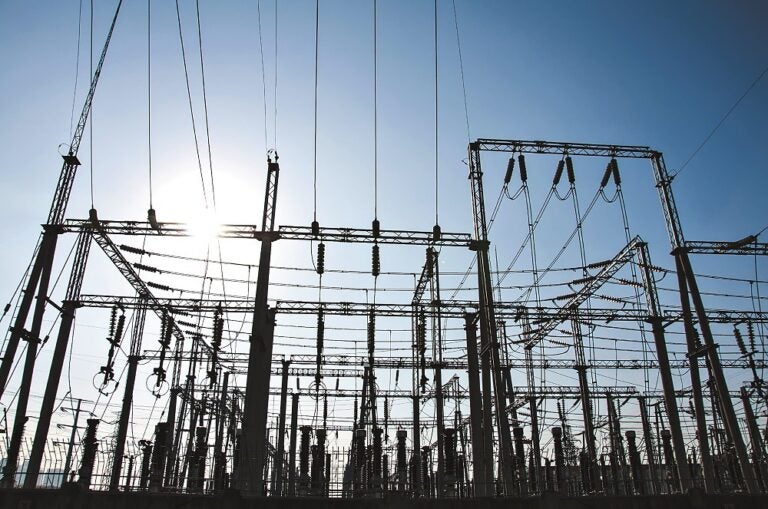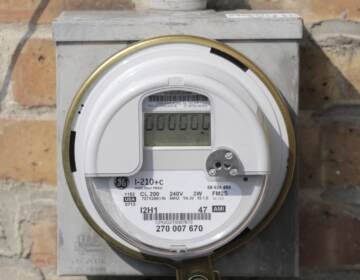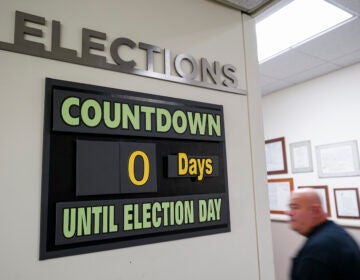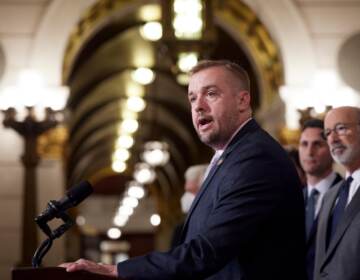Utility shut-off protections in Pa. would be expanded to summer months under bill
The legislature must reauthorize a law that shields people from winter utility shut-offs before the end of the year.

A transformer station. (Courtesy U.S. Department of Energy via Flickr)
This story originally appeared on Spotlight PA.
Pennsylvania lawmakers have until the end of 2024 to reauthorize a key area of state law that protects low-income utility customers from sudden shut-offs when behind on their bills, and some are taking advantage of the deadline to push for new consumer protections.
The law, enacted in 2004 and reauthorized every 10 years, was designed to both shield people from losing heat in winter and give utility companies more options to collect unpaid bills, with an eye on keeping rates down for all consumers.
With another reauthorization looming, consumer advocates are trying to make a case that the law favors utility companies over households, and they’re pitching changes that include a moratorium on summer shut-offs.
As with every issue in a divided legislature, the fate of those provisions is tied to backroom bargaining between the Democratic-controlled state House and the Republican-controlled state Senate.
“We expect conversations to be robust throughout the course of calendar year 2024,” state Rep. Rob Matzie (D., Beaver), chair of the state House Consumer Protection, Utilities & Technology Committee, said during a hearing Wednesday.
In its current form, the law represents a compromise. It took discretion away from the state’s Public Utility Commission to design specific repayment plans and allowed utilities to require full repayment, plus fees, before restarting service.
However, it also includes protections for customers, some of which apply only to people who meet certain income requirements.
Protections include requiring electric, gas, and water companies to contact customers before shutting off services; banning electric and gas utility disconnections in winter; and allowing customers to dispute their bills. Customers can also provide a doctor’s note that shows a member of the household has a medical condition that “requires the continuation of service” to block a shut-off.
Reauthorizing the law as written isn’t controversial, according to Stephen DeFrank, chair of the state Public Utility Commission.
“I think that this is a worthwhile review. I think that it’s good to do this every 10 years,” he told Spotlight PA. “And I think that should continue … The landscape is ever-changing, and we need to be cognizant of that.”
The commission has backed some tweaks to the law, including one that would give the agency more flexibility to set up repayment plans. Consumer advocates also have ideas about how to improve the law to better protect vulnerable Pennsylvanians.
Elizabeth Marx — executive director of the Pennsylvania Utility Law Project, a nonprofit that provides legal aid to individuals struggling with utility bills — told lawmakers at a hearing Wednesday that the law is “punitive,” particularly by allowing for additional fees, fines, and deposits that can compound a low-income household’s debt.
Rather than lower costs, Marx said, the law has “exacerbated utility insecurity and resulted in stark disparities in debt levels and termination rates for economically vulnerable Pennsylvanians.”
In her written testimony, Marx said that as of 2021, low-income households held just over 50% of electric utility debt and 30% of gas utility debt. She also noted that despite the law, utility shut-offs for low-income customers have still spiked in times of high energy prices.
A proposal from Matzie attempts to address these concerns.
Under his reauthorization bill, utilities would be banned from charging customers deposits for setting up service and reconnection fees if they are restarting service.
It would also create a moratorium on utility shut-offs during July and August, expand existing protections to water customers, require utilities to pre-screen customers for payment assistance programs, and give the state Public Utility Commission more flexibility to create longer-term payment plans for customers behind on their bills.
“Consumer is the first word in the name of our committee,” Matzie said Wednesday during a hearing on his proposal. He also acknowledged a need to balance expanded protections with utilities’ concerns.
The Energy Association of Pennsylvania, a trade group that represents electric and gas utility companies, expressed opposition to many of those measures Wednesday.
In written testimony, Terrance Fitzpatrick, a former PUC commissioner who now leads the association, argued that the law’s current protections are “very fair to those who fall behind in paying their utility bills.”
“It is a hard truth, but we would ask you to consider that all of these additional protections are subject to abuse and that the cost of further obstructing the utility collections process will fall on the general body of customers,” Fitzpatrick said.
An August 2022 report from the National Energy Assistance Directors Association, which represents the state officials who dole out federal utility assistance dollars, found that American households held $16.1 billion in utility debt and that one in six families was behind on at least one utility bill.
That total was double what it was in 2019, a spike that the report blamed on rising energy prices and pandemic-driven job losses.
Aid is available. Pennsylvania distributes hundreds of millions of dollars a year through the federally funded LIHEAP program to low-income households struggling with energy bills.
Utility companies also offer aid programs and spent $567 million on such programs in 2022, according to the commission. Those programs vary from utility to utility, DeFrank told Spotlight PA, and can include cash assistance, temporary bill reduction, or weatherization to improve energy efficiency.
Overall, Pennsylvania utilities offer the second-highest total aid in the nation, according to DeFrank.
In Pennsylvania, gas and electric utilities billed residential customers for $11.2 billion in services in 2022 and wrote off $187 million due to nonpayment, according to Public Utility Commission data.
Those unpaid bills can become an “uncollectible expense” that utilities can cite when they petition the commission for a rate increase, said Fitzpatrick, meaning unpaid bills could be used by the companies to justify higher rates on all consumers.
The state House Consumer Protection, Utilities & Technology Committee did not vote on Matzie’s proposal Wednesday; rather, the panel received input from consumer advocates and the industry.
A separate reauthorization proposal has already advanced unanimously out of committee in the state Senate. The measure, sponsored by state Sen. Lisa Boscola (D., Northampton), does not include a number of the state House’s proposed consumer protections, such as the summer shut-off moratorium.
Any reauthorization bill needs to pass both the state House and Senate and be signed by Democratic Gov. Josh Shapiro for the shut-off protection law to stay in effect.
The state Senate returns for a voting session on Feb. 5; Boscola’s bill could come up for a floor vote in the upper chamber as soon as that week. The state House returns on March 17.
 Spotlight PA is an independent, nonpartisan, and nonprofit newsroom producing investigative and public-service journalism that holds the powerful to account and drives positive change in Pennsylvania.
Spotlight PA is an independent, nonpartisan, and nonprofit newsroom producing investigative and public-service journalism that holds the powerful to account and drives positive change in Pennsylvania.
WHYY is your source for fact-based, in-depth journalism and information. As a nonprofit organization, we rely on financial support from readers like you. Please give today.





